Рецензенты кафедра английского языка Новгородского государственного
 Скачать 2.19 Mb. Скачать 2.19 Mb.
|
Lesson 7 MEALS AND COOKINGINTRODUCTORY READING AND TALK Living in Russia one cannot but stick to a Russian diet. Keeping this diet for an Englishman is fatal. The Russians have meals four times a day and their cuisine is quite intricate. Every person starts his or her day with breakfast. Poor Englishmen are sentenced to either a continental or an English breakfast. From the Russian point of view, when one has it continental it actually means that one has no breakfast at all, because it means drinking a cup of coffee and eating a bun. A month of continental breakfasts for some Russians would mean starving. The English breakfast is a bit better, as it consists of one or two fried eggs, grilled sausages, bacon, tomatoes and mushrooms. The English have tea with milk and toast with butter and marmalade. As a choice one may have corn flakes with milk and sugar or porridge. In Russia people may have anything for breakfast. Some good-humoured individuals even prefer soup, but, of course, sandwiches and coffee are very popular. One can easily understand that in Great Britain by one o'clock people are very much ready for lunch. Lunch is the biggest meal of the day. That would be music for a Russian's ears until he or she learns what lunch really consists of. It may be a meat or fish course with soft drinks followed by a sweet course. The heart of a Russian person fills with joy when the hands of the clock approach three o'clock. His or her dinner includes three courses. A Russian will have a starter (salad, herring, cheese, etc.), soup, steaks, chops, or fish fillets with garnish, a lot of bread, of course, and something to drink. The more the better. At four or five the Russians may have a bite: waffles, cakes with juice, tea, cocoa, or something of the kind. In Great Britain they have dinner at five or six. Soup may be served then, but one should not be misled by the word "soup". British soup is just thin paste and a portion is three times smaller than in Russia. A lot of British prefer to eat out. "Fish and Chips" shops are very popular with their take-away food. The more sophisticated public goes to Chinese, Italian, seafood or other restaurants and experiments with shrimp, inedible vegetables and hot drinks. Supper in Russia means one more big meal at seven. The table groans with food again. In England it is just a small snack — a glass of milk with biscuits at ten. Most Russians have never counted calories and they are deeply convinced that their food is healthy. Some housewives may admit that it takes some time to prepare all the stuff, including pickles, home-made preserves and traditional Russian pies and pancakes. But they don't seem to mind too much and boil, fry, roast, grill, broil, bake and make. Paraphrasing a famous proverb one can say: 'What is a Russian man's meat is a British man's poison'*. * What is one man's meat is another man's poison — Что русскому хорошо, то немцу — смерть (поcл.). 1. Say when you have meals and what you like to eat and drink for breakfast, dinner and supper. 2. Say what you dislike for breakfast, dinner and supper. 3. Say what they serve in the refectory at your university and what you usually choose. 4. Say what you can cook in five minutes. 5. Look of the pictures and say what food is typically English and typically Russian. 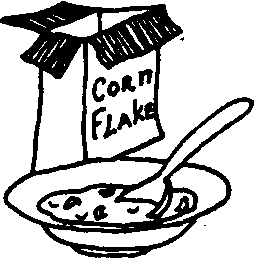 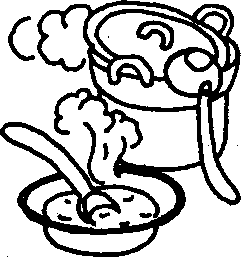 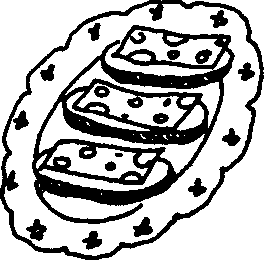 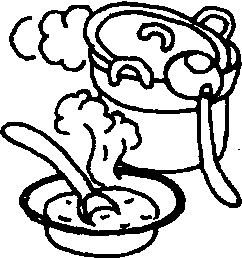 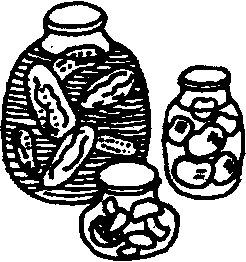 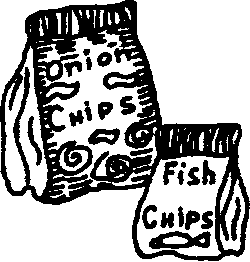 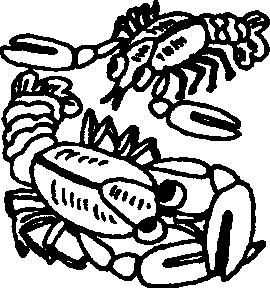 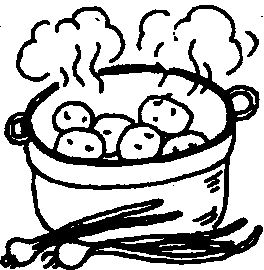 ○ TEXT The Three Fat Women of Antibes (Extract from the story by S. Maugham. Abridged) One was called Mrs. Richman and she was a widow. The second was called Mrs. Sutcliffe; she was American and she had. divorced two husbands. The third was called Miss Hickson and she was a spinster. They were great friends, Miss Hickson, Mrs. Richman and Arrow Sutcliffe. It was their fat that had brought them together' and bridge that had cemented their alliance. They would have been independent of anyone else if they had not needed a fourth at bridge.2 It was for this reason that Frank* invited Lena Finch to come and stay with them at Antibes. They were spending some weeks there on Frank's suggestion. She proposed then that they should take a house at Antibes, where they could get plenty of exercise — everyone knew that nothing slimmed you like swimming. With a cook of their own they could at least avoid things that were obviously fattening. The plan worked very well. * Frank — Frances Hickson But the fourth at bridge continued to be the difficulty. One morning when they were sitting in pyjamas on the terrace, drinking their tea (without milk or sugar), Frank looked up from the letters. 'Lena Finch is coming down to the Riviera,' she said. 'What about asking her to come here for a fortnight?' 'Does she play bridge?' asked Beatrice*. * Beatrice — Mis. Richman 'You bet your life she does,'3 boomed Frank in her deep voice. 'And a damned good game too. We should be absolutely independent of outsiders.'4 It was settled. And three days later Lena Finch arrived. Frank met her at the station. She was in deep mourning for the recent death of her husband. Lena was not, however, unduly depressed. Frank introduced the stranger to her two friends and they sat down in what was known as the Monkey House. It was crowded with chattering people, who were seated at the tables having drinks. The conversation was gay and easy, and presently they strolled back to the villa for luncheon. In each napkin were two little antifat rusks. Lena gave a bright smile as she put them by the side of her plate. 'May I have some bread?' she asked. The grossest indecency would not have fallen on the ears of those three women.5 Not one of them had eaten bread for ten years. Frank, the good hostess, recovered herself first. 'Of course, darling,' she said and turning to the butler asked him to bring some. 'And some butter,' said Lena in that pleasant easy way of hers. There was a moment's embarrassed silence. 'I don't know if there's any in the house,' said Frank, 'but I'll inquire'. The butler brought a long crisp roll of French bread. Lena slit it in two and plastered it with the butter, which was miraculously produced.6 A grilled sole was served. The rest of the luncheon consisted of lamb cutlets, with the fat carefully removed, and spinach boiled in water, with stewed pears to end up with, Lena tasted her pears and gave the butler a look of inquiry. That resourceful man understood her at once and though powdered sugar had never been served at that table before handed her without a moment's hesitation a bowl of it. She helped herself liberally.7 The other three pretended not to notice. Coffee was served and Lena took three lumps of sugar in hers. 'You have a very sweet tooth,' said Arrow in a tone which she struggled to keep friendly.8 But human nature is weak. You must not ask too much of it. They ate grilled fish while Lena ate macaroni sizzling with cheese and butter; they ate grilled cutlets and boiled spinach while Lena ate pate de foie gras;9 twice a week they ate hard-boiled eggs and raw tomatoes, while Lena ate peas swimming in cream and potatoes cooked in all sorts of delicious ways. The chef was a good chef and he leapt at the opportunity afforded him10 to send up one dish more rich, tasty and succulent than the other. The butler disclosed the fact11 that he could make half a dozen kinds of cocktail and Lena informed them that the doctor recommended her to drink burgundy at luncheon and champagne at dinner. The three fat women persevered. Lena was going to stay with friends on the Italian Riviera and Frank saw her off by the same train as that by which she had arrived. When she turned away from the departing train she heaved such a vast sigh of relief12 that the platform shook beneath her. She passed through the Monkey House, looking about her to say Good morning to anyone she knew, and then stopped dead still.13 Beatrice was sitting at one of the tables, by herself. 'Beatrice, what are you doing?' she cried in her deep voice. Beatrice looked at her coolly. 'Eating,' she answered. In front of Beatrice was a plate of croissants14 and a plate of butter, a pot of strawberry jam, coffee and a jug of cream. Beatrice was spreading butter thick on the delicious hot bread, covering this with jam, and then pouring the thick cream overall. The tears welled up to Frank's eyes. Suddenly she felt very weak and womanly. Speechless she sank down on a chair by Beatrice's side. A waiter came up. With a pathetic gesture she waved towards the coffee and croissants. 'I'll have the same,' she sighed. In a moment the waiter brought her croissants, butter, jam and coffee. 'Where's the cream, you fool?' she roared like a lioness. She began to eat. She ate gluttonously. The place was beginning to fill up with bathers. Presently Arrow strolled along. On her way she caught sight of Frank and Beatrice. She stopped. She could hardly believe her eyes. 'My God!' she cried. 'You beasts. You hogs.' She seized a chair. 'Waiter.' In the twinkling of an eye the waiter was at her side. 'Bring me what these ladies are having,' she ordered. Frank lifted her great heavy head from her plate. 'Bring me some pate de foie gras,' she boomed. The coffee was brought and the hot rolls and cream and the pate de foie gras. They spread the cream on the pate and they ate it. They devoured great spoonfuls of jam. They crunched the delicious crisp bread voluptuously. They ate with solemn, ecstatic fervour. 'I haven't eaten potatoes for twenty-five years,' said Frank in a far-off brooding tone. 'Waiter,' cried Beatrice, 'bring fried potatoes for three.' The potatoes were brought. They ate them with their fingers. 'Bring me a dry Martini,' said Arrow. 'Bring me a double dry Martini,' said Frank. 'Bring three double dry Martinis,' said Beatrice. They were brought and drunk at a gulp. 'I wonder if they've got any chocolate eclaires,' said Beatrice. 'Of course they have.' And of course they had. Frank thrust one whole into her huge mouth, swallowed it and seized another, but before she ate it she looked at the other two and plunged a vindictive dagger into the heart of the monstrous Lena.15 'You can say what you like, but the troth is she played a damned rotten game of bridge, really.' 'Lousy,' agreed Arrow. But Beatrice suddenly thought she would like a meringue. Proper Names Antibes ['ti:b] (French) — Антиб Somerset Maugham ['smst 'mm] — Сомерсет Моэм Beatrice Richman [btrs 'rmn] — Беатрис Ричмен Arrow Sutcliffe ['r 'stklf] —Эрроу Сатклифф Frances Hickson ['frnss 'hksn] — Фрэнсис Хиксон Lena Finch ['li:n fn] — Лина Финч Riviera [,rv'еr] — Ривьера Martini [m'ti:n] — мартини (Прим.: коктейль из джина, вермута и горькой настойки) Vocabulary Notes 1. It was their fat that had brought them together... — Именно потому, что они были полные, они завязали знакомство ... 2. ... if they had not needed a fourth at bridge. — ... если бы им не нужен был четвёртый для игры в бридж. 3. 'You bet your life she does.' — «Бьюсь об заклад, что да.» 4. We should be absolutely independent of outsiders. — Мы бы совершенно не зависели от посторонних. 5. The grossest indecency would not have fallen on the ears of those three women. — Ничего более неприличного уши этих трёх женщин не слышали. 6. ... which was miraculously produced. — ... которое появилось чудесным образом. 7. She helped herself liberally. — Она положила себе щедрую порцию. 8. 'You have a very sweet tooth,' said Arrow in a tone which she straggled to keep friendly. — «Вы большая сладкоежка», — сказала Эрроу, изо всех сил пытаясь говорить дружелюбным тоном. 9. pâte de foie gras — [pte dз: 'f 'gr] — (фр.) паштет из гусиной печёнки 10. ... he leapt at the opportunity afforded him ... —...он ухватился за представившуюся ему возможность ... 11. The butler disclosed the fact that ... — Дворецкий признался, что ... 12. ... she heaved such a vast sigh of relief... — ... она так глубоко и с таким облегчением вздохнула ... 13. ... stopped dead still. — ... остановилась как вкопанная. 14. croissant — [krw's] — (фр.) круассан (Прим.: булочка в виде полумесяца из воздушного сдобного теста) 15. ... plunged а vindictive dagger into the heart of the monstrous Lena. — ... в отместку вонзила кинжал в сердце вероломной Лины. Comprehension Check 1. What were Mrs. Richman, Mrs. Sutcliffe and Miss Hickson? 2. Why did they need the fourth person in their company? 3. Where were they staying and why? 4. What did, Frank suggest one morning? 5. How did Lena Finch and the ladies meet? 6. Where did the ladies go from the Monkey House? 7. What terrified the ladies at luncheon? 8. What did the ladies have for luncheon? 9. How did Lena's dishes and the ladies' food differ during her stay? 10. What kind of talents did the chef and the butler disclose? 11. How did Lena and Frank part? 12. When did Frank stop dead still? 13. What was Beatrice eating? 14. What did Frank suddenly do? 15. How did Arrow react when she saw the two ladies eating? 16. What else did the ladies order? 17. Did the ladies eat calmly or not? 18. What was Frank's revenge upon Lena like? Phonetic Text Drills ○ Exercise 1 Transcribe and pronounce correctly the words from the text. To cement, outsider, mourning, unduly, to stroll, luncheon, rusk, hostess, embarrassed, to inquire, roll, to plaster, miraculously, lamb, cutlet, spinach, stewed, pear, resourceful, powdered, macaroni, to sizzle, delicious, chef, succulent, burgundy, champagne, to persevere, to pour, pathetic, gluttonously, to devour, voluptuously, solemn, ecstatic, fervour, lousy, meringue. ○ Exercise 2 I. Pronounce the words and phases where the following clusters occur. 1. plosive + w the second was, the third was, it was, that were, what was, twice, twinkling. 2. plosive + r great, bridge, introduced, drinks, bright, bring, train, cried, cream, crisp, truth. 3. plosive + 1 settled, presently, butler, plastered, platform, plate, gluttonously. II. Say why the following clusters can be put under one heading and in what way they differ. 1. some weeks there, does she, as she, those three, was served, was sitting, was spreading. 2. that they, avoid things, but there, and three, informed them. Exercise 3 Transcribe the phrases and comment on the phonetic difficulties. It was their fat that had brought them together ... ... if they had not needed a fourth at bridge. ... powdered sugar had never been served at that table before ... ... and then stopped dead still. ○ Exercise 4 Transcribe and intone the following questions. 'What a'bout \asking her | to 'come here for a \fortnight? || 'Does she 'play /bridge? || 'May I 'have some /bread? || ^Beatrice, | 'what are you \doing? || 'Where’s the \cream, | you fool? || EXERCISES Exercise 1 I. Pick out from the text words and expressions denoting: a) food, b) drinks, c) adjectives used to describe dishes. Try to explain their meaning in English or translate them into Russian. II. Pick out from the text: a) all phrases used to denote quantities of foodstuffs, i.e. "a lump of sugar", etc.; b) all words used to denote the ways food may be cooked, i.e. "boil — boiled", etc. Exercise 2 Find in the text words or phrases similar in meaning to the following. Read aloud the sentences containing them. To make someone thinner; juicy and delicious; food making people fat easily; to drink; to cut into two parts; to put something on one's plate; to put butter on top; to like sweet things; to use hands when eating; to eat noisily; to eat fast, swallowing large quantities. Exercise 3 Form other parts of speech from the following words. Give as many variants as possible. Comment on the shift of meaning in certain cases. Verbs: to cement, to slim, to crowd, to stroll, to recover, to slit, to plaster, to produce, to remove, to cook, to wave, to fill, to seize. Nouns: fat, exercise, difficulty, conversation, drink, hostess, silence, water, inquiry, finger, gulp. Exercise 4 Say what other meanings the following words from the text may have. Rich, roll, to boom, cream, to propose, deep, bright, to recover, to help (oneself), heart, lousy. Exercise 5 Find the English equivalents to the following Russian phrases. A. Сухарик; пить напитки; положить рядом с тарелкой; длинный батон с хрустящей корочкой; разрезать пополам; попробовать (о пище); удалить жир; положить побольше; подать кофе; быть сладкоежкой; вкусно приготовленный; повар; намазывать масло толстым слоем; жадно есть; обжора; принести то же, что у кого-либо; поглощать; ложка варенья; грызть с хрустом; принести три порции жареной картошки; есть руками; выпить одним глотком; засунуть целиком в рот. В. Скрепить союз; по этой причине; по предложению; всё шло по плану; широко улыбнуться; прийти в себя; неловкое молчание; появиться чудесным образом; человек слаб; ухватиться за предоставленную возможность; вздохнуть с облегчением; сидеть в одиночестве; выразительный жест; не верить глазам; в мгновение ока. Exercise 6 Put in the missing prepositions looking for help in the text. 1. It was strange that a quiet restaurant round the comer was crowded ... people at this late hour. 2. Young people just starting their life always want to be independent... their parents. 3. The teacher said the phrase ... a tone which could not be misinterpreted. 4. The boys were so hungry that they did not notice the forks lying ... the sides of their plates and started eating the fish... their fingers. 5. The hostess wanted to introduce a new chef... all the other cooks in the restaurant. 6. Something was wrong with the lady's health and so spicy dishes were never served ... her table. 7. The girl gave up dieting and ordered two cakes ... a moment's hesitation. 8. The news fell... my ears like a bolt from the blue. 9. The English certainly know how to eat buns: they slit them ... two, plaster ... butter, and put jam and cream on top. 10. At the sound all the readers in the reading-room immediately lifted their heads ... their books. 11. You should spread pate ... butter, then your sandwich will taste better. 12. In the restaurant we ordered salad, steaks, fried potatoes and ice-cream ... three. 13. In Great Britain they never drink whiskey or vodka ... a gulp; they sip it. 14. When we were seated ... the tables, I suddenly caught sight ... my old friends passing by. Exercise 7 Complete the sentences and expand on them. 1. It was their fat that had brought... 2. They were spending two weeks there on Frank's ... 3. Nothing slimmed you like ... 4. She was in deep mourning for ... 5. In each napkin were ... 6. There was a moment's embarrassed ... 7. A grilled sole was served. The rest of the luncheon consisted of... 8. You have a very sweet... 9. The chef was a good chef and he ... 10. 'Beatrice, what are you doing?' she cried ... 11. The tears welled up to Frank's eyes. Suddenly she felt... 12. 'I'll have the same,' she sighed. In a moment the waiter... 13. Presently Arrow strolled along. On her way she caught... 14. The coffee was brought, and the hot rolls and ... 15. The potatoes were brought. They ate them with ... 16. Frank thrust one whole into her huge ... Exercise 8 Express the same idea using different wording and grammar. 1. It was their fat that had brought them together and bridge that had cemented their alliance. 2. They would have been independent of anyone else if they had not needed a fourth at bridge. 3. The plan worked very well. 4. But the fourth at bridge continued to be the difficulty. 5. We should be absolutely independent of outsiders. 6. The conversation was gay and easy, and presently they strolled back to the villa for luncheon. 7. Lena gave a bright smile as she put them by the side of her plate. 8. The grossest indecency would not have fallen on the ears of those three women. 9. Frank, the good hostess, recovered herself first. 10. Lena slit it in two and plastered it with butter, which was miraculously produced. 11. She helped herself liberally. 12. 'You have a very sweet tooth', said Arrow in a tone which she struggled to keep friendly. 13. The chef was a good chef and he leapt at the opportunity afforded him to send up one dish more rich, tasty and succulent than the other. 14. The tears welled up to Frank's eyes. 15. The place was beginning to fill up with bathers. 16. On her way she caught sight of Frank and Beatrice. Exercise 9 Speak about the three ladies' stay at Antibes: 1. in the third person; 2. in the person of any of the fat women; 3. in the person of Lena; 4. in the person of the butter. Exercise 10 Discussion points. 1. Why could none of the three fat women slim on her own? Why did all of them need company? 2. Did the three fat ladies have good table manners? Prove your point. 3. Did Lena ruin the fat women's plan on purpose or by chance? 4. Do you think that human nature is weak? 5. Why did the three fat women give way to their feelings? 6. What do you think of the last remarks of the ladies about Lena's bridge playing? Exercise 11 Study the list of English verbs and group the ones close in meaning matching them with the Russian verbs. Comment upon the difference in their meanings. English: to swallow, to crunch, to champ, to hog, to munch, to gobble (up), to nibble at something, to gnaw, to gulp, to chew, to devour, to bolt, to bite.  Exercise 12 Study the table of calories in food and write a menu for a day for: a) a person who wants to lose weight; b) a person who wants to gain weight. 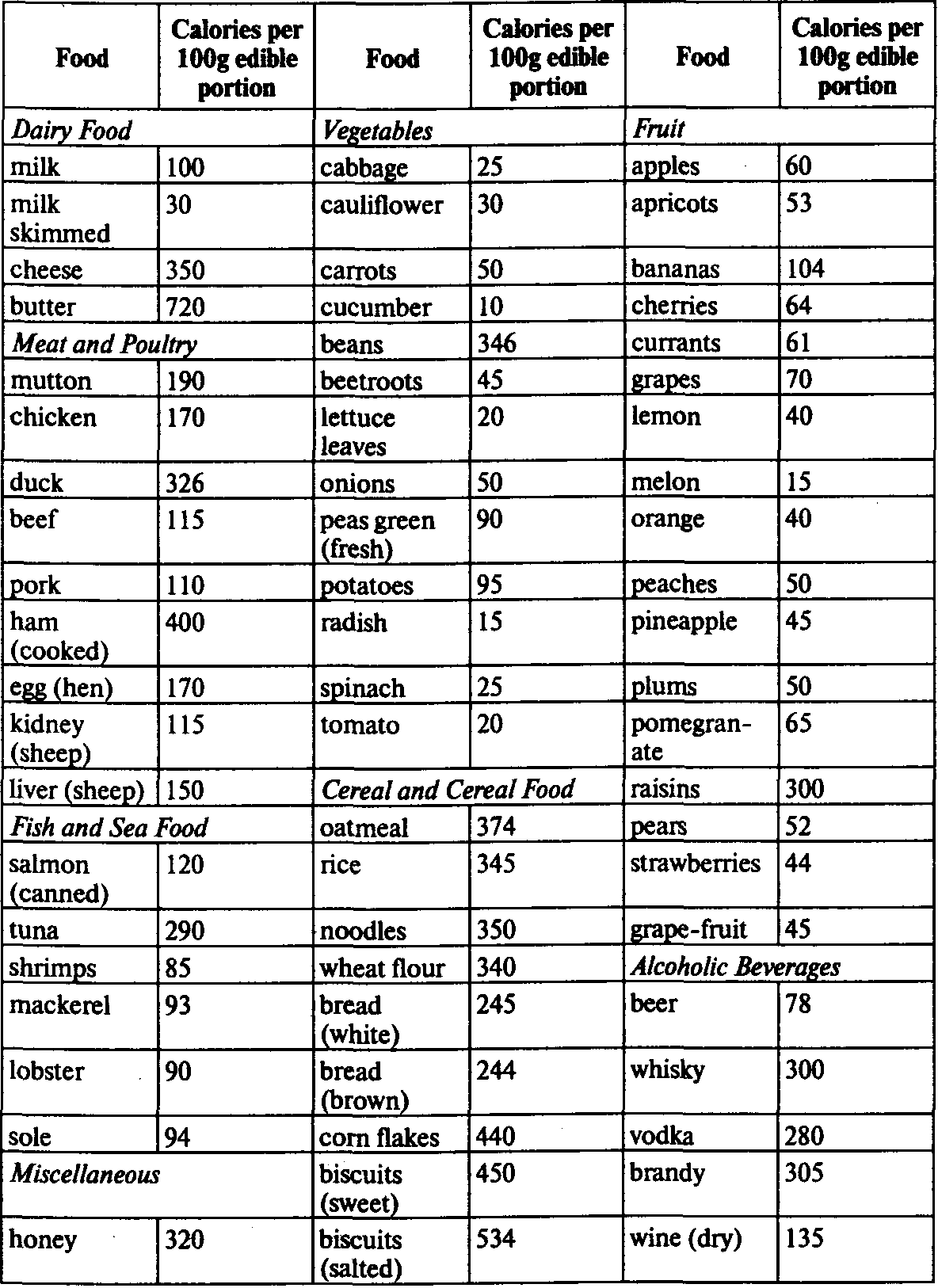  Exercise 13 Complete the list with names of food or drink. Skip the letters X and Z. 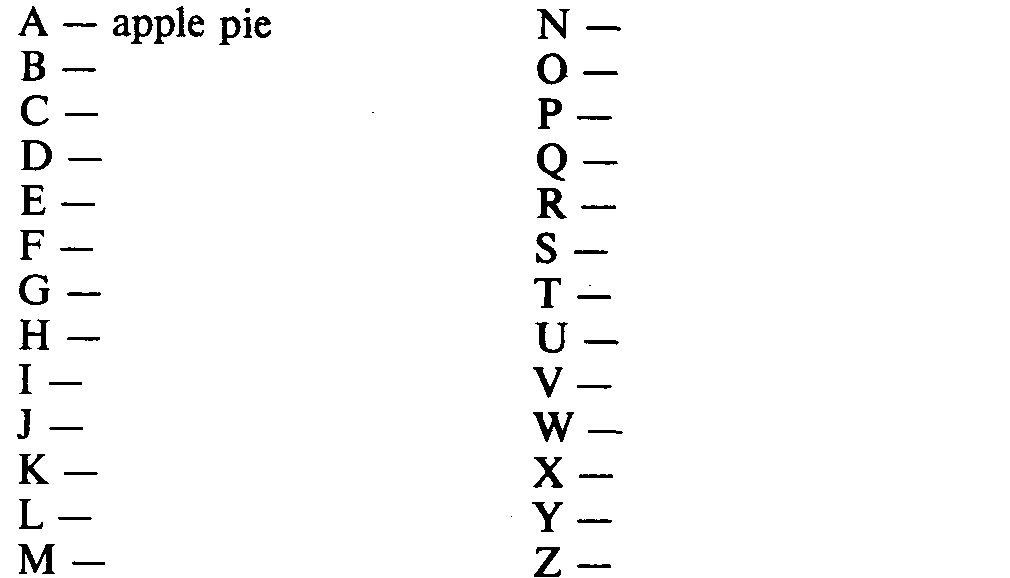 Exercise 14 I. What do we call places where people go to eat? Match the words in the left column with the definitions in the right column. 1. snack bar A. originally a British public house licensed to serve beer and other alcoholic beverages. Customers get their drinks from the counter and either stand there or sit at the tables. Some light snacks like pies and sandwiches are served. 2. café/cafeteria B. a counter where food and drink may be bought and eaten (e.g. in a railway station or on a train) 3. pizzeria C. small restaurant mainly concentrating on cakes, sandwiches, coffee and tea. Choice of food is often very limited. 4. refectory D. a place where guests normally come fairly late and stay until the small hours. Always with dancing and often also with floor shows. Food is some times available. 5. buffet E. a place where students or workers have their lunch, usually connected with a school, office or factory. 6. night club F. a nice place where meals are served to customers. 7. canteen G. a modest restaurant where customers collect their food on trays at counters and carry it to tables. Choice of dishes is based on convenience and speed, with food like hambuigers, sausages and sandwiches. 8. pub H. a restaurant specializing in pizzas, and other Italian-type food. 9. restaurant I. a university cafe II. What types of restaurant would you recommend to the following people? 1. A young couple who want food and some entertainment late at night. 2. A man who wants a meal in a place where he can meet some local people. 3. Someone wanting a quick, cheap meal. 4. Someone at a railway station. 5. Someone who wants non-English food. 6. A student staying at the university all day. 7. A factory worker at lunch-time. 8. A family who wants to celebrate some special occasion. Exercise 15 1. Study the following words, paying attention to the difference in meaning in English and in Russian, though they may sound similar in the two languages. Explain the difference. a) specialty, b) marmalade, c) biscuits, d) cutlet. 2. Give all English equivalents to the words а) тесто, b) кусок. 3. What is of interest in the meaning of the word "tea" in English? Exercise 16 Sum up the following text in 5 sentences. To travel through the whole of England is to realise what a rich and varied country it is. From one county to the next you could be on a different island, this being particularly true of the East and West coasts, the North of England and the South. The food from place to place varies, too. The thick clotted cream of Cornwall and Devonshire does not travel far from where it'was made, any more than the succulent Cumberland sausage leaves Cumbria. The wildfowl of the Fens do not mingle with the fat Aylesbury ducklings and Lincolnshire stuffed chine also stays at home. The English are rightly proud of their heritage and today, amongst the welter of take-aways and fast food places, they are even more determined to keep it alive. Traditions sometimes connected with food are not lost either. The Reverend Sydney Smith (1771—1845), the witty, food-loving canon of St. Paul's wrote: 'I am convinced that character, talents, virtues and qualities are powerfiilly affected by beef, mutton, pie crust and rich soup.' ○ Exercise 17 I. Read the dialogue in pairs. Visit to Dietician D r. J о n e s: Good morning, Mrs. Fat. Sit down, please. Mrs. Fat: Good morning. Dr. Jones. Do you mind if I sit on the sofa? D r. J о n e s: No, not at аll. You can take any seat you like. So you would tike to lose weight, wouldn't you? Mrs. Fat: Exactly. I've been overweight all my life and now I think it's time I started dieting. D r. J o n e s: Oh, yes. I see. You know... before I can recommend you a particular diet I must team all about your eating habits. How many meals a day do you normally have? Mrs. Fat: I usually have only three meals a day. I mean breakfast, lunch and dinner, but unfortunately I very often eat between meals. D r. J о n e s: What do you have for breakfast? Mrs. Fat: A traditional English breakfast. I have a glass of orange juice, a bowl of cereal and bacon and eggs. And then I drink tea. D r. J о n e s: Do you take milk in your tea? Mrs. Fat: I normally drink tea with cream, though I realise that I should have it with skimmed milk. D r. J о n e s: And what about lunch? Mrs. Fat: Well, that depends. On some days I just have a couple of sandwiches for lunch, but sometimes I also have a bowl of soup and cakes or pies to follow. Dr. Jones: What do you have for dinner and when do you have it? Mrs. Fat: I normally have dinner at 8 p.m. I know it's a bit too late, it just happens so. What do I have? You know, I like to have a very substantial dinner — a starter, like a salad or assorted meat, followed by a main course such as beefsteak or fish and chips and then dessert and tea or coffee. D r. J о n e s: What do you have for dessert as a rule? Mrs. Fat: Ice-cream or cakes, or both. D r. J о n e s: And what do you eat between meals? Mrs. Fat: Peanuts, chocolate, popcorn, crisps and stuff. Sometimes I just like to nibble candies. D r. J о n e s: In fact, many people do the same and yet they have no problems with excess weight. Let me see... Do you fry one or two eggs with your bacon in the morning? Mrs. Fat: I actually take eight eggs, but I share my breakfast with my toy-poodle dog. D r. J о n e s: I see. Here is my prescription: Don't change your diet. Change your dog. Replace it with a Labrador. Or keep both dogs and share all your meals with them. And here is the telephone number of a vet, who is a very good dog dietician, just in case your dogs might need a correction of their diet. II. Explain the meaning of the following words: food, meal, dish, course, overweight, diet, breakfast, lunch, dinner, supper, snack. III. Dramatize the dialogue between Mrs. Fat and Dr. Jones. IV. Translate into English: 1. Я завтракаю в восемь часов утра. 2. За завтраком я обычно съедаю бутерброд и выпиваю чашку чая. 3. Мои брат всегда ест яичницу с ветчиной на завтрак. 4. Что ты ешь в обед на второе? 5. Какой десерт нравится твоей маме? 6. Я никогда не перекусываю между завтраком, обедом и ужином. 7. Вы хотели бы похудеть? 8. У тебя нет лишнего веса и тебе не надо садиться на диету. 9. Я терпеть не могу рыбу с картошкой. 10. Мой друг постоянно ест жареный арахис или соленую воздушную кукурузу. Меня это раздражает. 11. — Что такое традиционный английский завтрак? — По-моему, это стакан сока, кукурузные хлопья с молоком, яичница с ветчиной и чай. 12. Я люблю плотно поесть в обед — закуску, суп, второе, десерт и выпить чашечку крепкого кофе. Exercise 18 Say which drinks are good for health and which are not. Give your reasons. Orange juice, milk, skimmed milk, tea, coffee, beer, brandy, cognac, Scotch whisky, Coca-Cola, Pepsi-Cola, apple juice, tomato juice, pineapple juice, gin, rum, vodka, champagne, port, dry sherry, sweet sherry, vermouth, ale, lager. Play a game. Write a healthy menu for breakfast, lunch or dinner, and start the name of each dish with the same letter. ► Pattern: A MENU FOR DINNER Asparagus soup Aubergines in sauce Apple tart Apricot juice Exercise 20 Translate into English. 1. Я люблю всё мучное. Я знаю, что от пирожков, булочек, пирожных и печенья ужасно полнеют, но ничего не могу с собой поделать. 2. Сейчас очень многие увлекаются вегетарианской пищей. Они едят любые овощи — картошку, морковь, свёклу, цветную капусту, горох, салат, но совсем не едят мяса. 3. Постарайтесь сократить употребление говядины, свинины, баранины. Лучше ешьте куру, только без кожи. Это пойдет Вам на пользу. 4. — Какое масло лучше использовать для приготовления пищи — сливочное или растительное? — Смотря для чего. Если хочешь, чтобы было сытнее, то сливочное, а если хочешь быть здоровее, то растительное. Говорят, самое полезное масло — растительное. 5. Какие блюда самые популярные в русской кухне? Блины, борщ, котлеты, пироги, грибы, пельмени. А из напитков, пожалуй, чай, квас, кисель, клюквенный морс. 6. — Я заказал столик на двоих на девять часов, но мы минут на пятнадцать опоздаем. — Ничего страшного. 7. Я буду есть то, что ест вон та дама. Посмотри, с каким чувством она поглощает то, что лежит у неё на тарелке. 8. Ну ты и сладкоежка! Неужели ты не понимаешь, что нельзя есть столько шоколада и конфет. Кстати, ты давно не была у зубного, не так ли? 9. Когда поедем на пикник, надо не забыть взять ведро и поварёшку. Без ножей и вилок мы, может быть, и обойдёмся, а вот ложки надо взять обязательно. 10. — Посмотри, какой обжора там за столиком у окна. Он ест ужасно быстро и жадно. — Может, он просто очень голоден. 11. Этот пудинг очень сытный, я буду есть его без сливок и без сметаны. 12. Какой сочный арбуз! Я, пожалуй, съем еще кусочек. 13. Дай мне дольку апельсина, кусок сахара, щепотку соли, кусочек хлеба и плитку шоколада. Я буду готовить свое фирменное блюдо. 14. — Я знаю людей, которые не едят ничего жареного или варёного. Они едят только сырую пищу. — Неужели? И они ещё живы? — Да, живы и здоровы. 15. Некоторые девушки так усердствуют с похуданием, что заболевают. Всё хорошо в меру. Exercise 21 1. Look at the picture and tell the class how one should lay the table for two. Say where one puts: a soup plate, a dinner plate, a bottom plate, a bread plate, a knife, a fork, a table spoon, a napkin, salt, pepper, mustard, a wine glass. 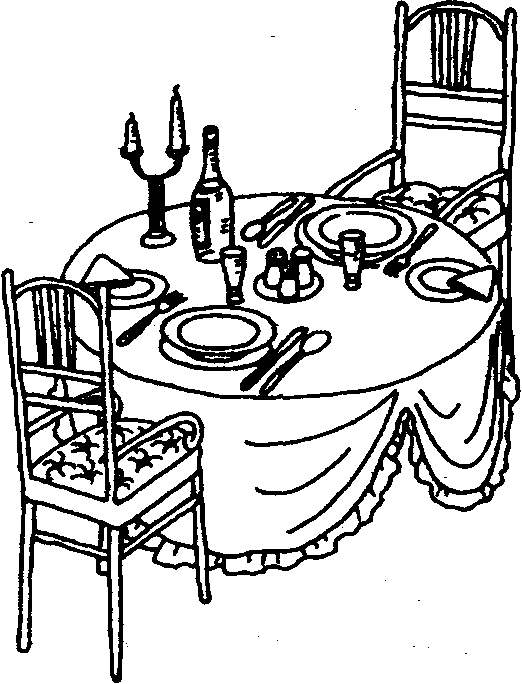 Exercise 22 I. Read the list of Table Don'ts. 1. Elbows are never put on the table while one is eating. 2. Don't lift your plate up to your mouth. 3. Don't push back your plate when finished. It remains exactly where it is until whoever is waiting on you removes it. 4. Don't lean back and announce, 'I'm through'. The fact that you have put your fork and knife together on the plate shows that you have finished. 5. Don't wait until all plates are served; after a few guests have been served, it is perfectly all right to start eating. 6. Don't let others see what you have in your mouth. 7. Don't make a noise when eating. 8. Put the food in your mouth with your fork, never with your knife. II. Look at the pictures and say which Table Don'ts are not observed. 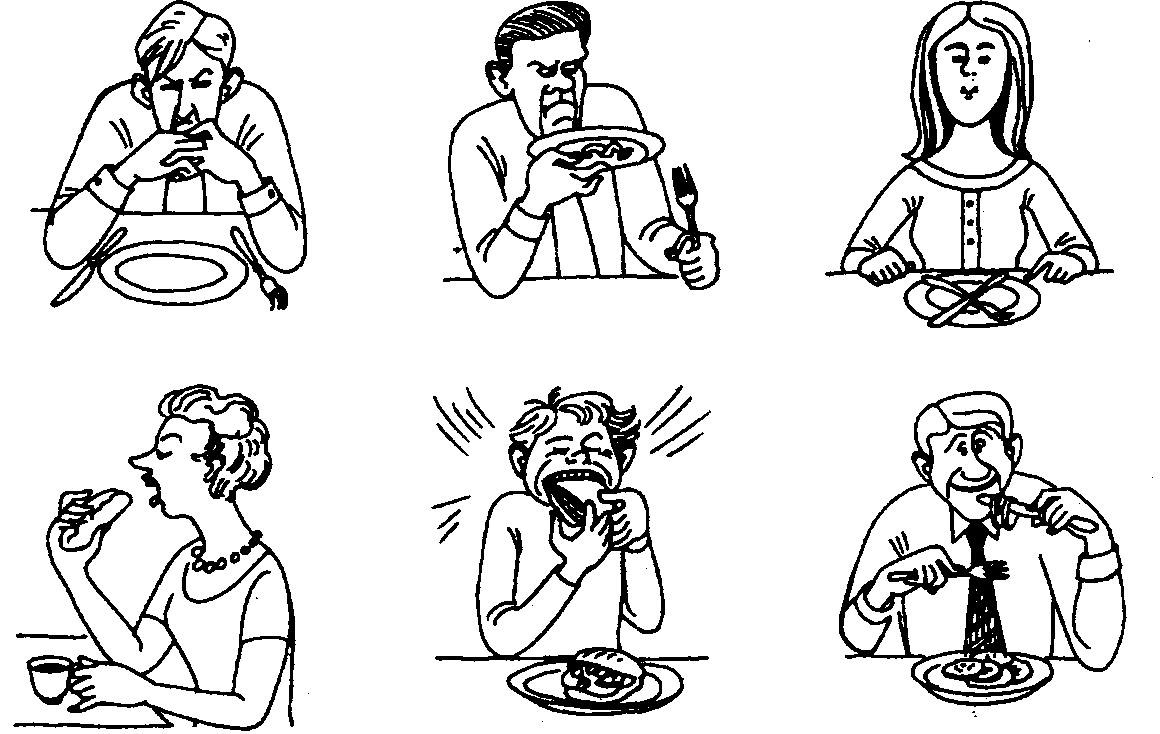 II. Read the list of Table Dos. 1. Put your napkin on your lap. Do not wear it around your neck. 2. Gravy should be put on the meat, and the condiment, pickles and jelly at the side of whatever they accompany. 3. All juicy or soft fruit or cake is best eaten with a fork and when necessary a spoon or a knife also. 4. When passing your plate for a second helping always leave a knife and a fork on the plate and be sure the handles are far enough on not to topple off. 5. You may use your knife or a piece of dry crust as a pusher to guide and hold each mouthful for the fork to lift. 6. Fish bones are taken between finger and thumb and removed between compressed lips. 7. Bread should always be broken into moderate-sized pieces with the fingers before being eaten. IV. Complete the list of Table Dos and say how one should eat: soup, meat, poultry, lobster, bananas, oranges, apples, melons and watermelons. Exercise 23 Give the Russian equivalents to the following verbs and phrases and use them in sentences: heat, simmer, boil, stir, cut, mince, chop, rub something into something, soak, bake, beat, mix, strain off the liquid, pour, roll out, melt, whisk, peel, squeeze out, bring to the boil. Exercise 24 1. Look at the pictures below and name the objects, choosing words from the list: saucepan, frying pan, bowl, scoop, whistling kettle, colander, mincer, coffee pot. 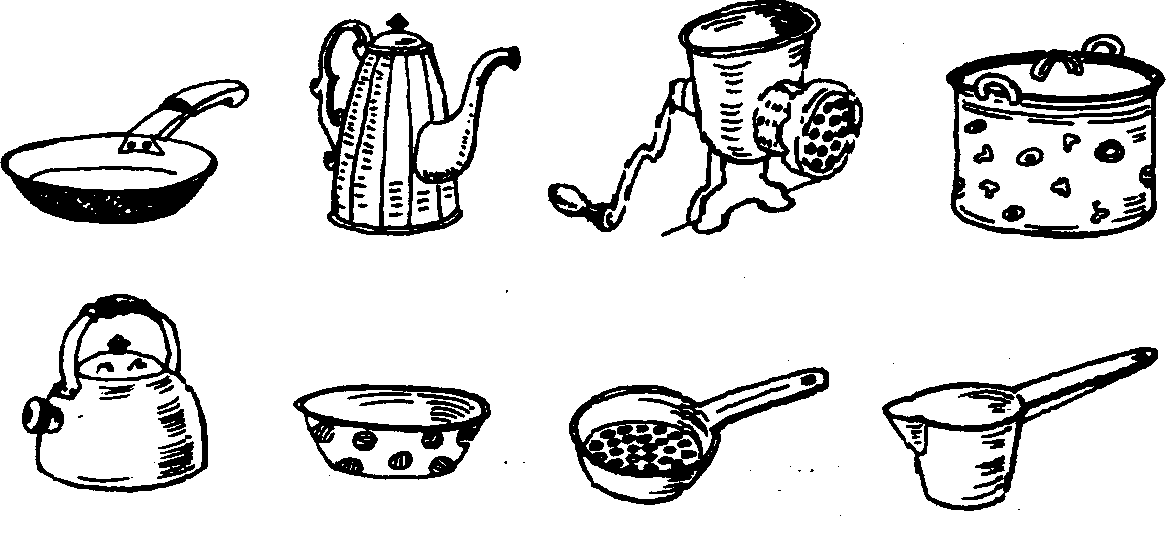 II. Say which of these objects you use when you perform actions denoted by the words from exercise 23. ► Pattern: When I boil water I use a saucepan. Exercise 25 Translate the following recipes into Russian. 1. Hot chocolate. Heat 600 ml (1 pint) milk, add 100g (4 oz) chopped plain or bitter chocolate and stir, when melted, bring to a simmer and whisk for 3 minutes. Sweeten to taste. Pour hot into cups and top with whipped cream. 2. Oat cakes. Sift flour into a bowl and add salt. Rub in fat until texture resembles breadcrumbs. Add currant, lemon juice and rind, then mix to a fairly firm dough with about 4 tablespoons water or milk and water. Divide the dough into 4 pieces and put on to a floured surface. Roll into circles and fry in the oil until brown all over. Drain well and eat hot, sprinkled with sugar. 3. Ham baked with chestnuts. Mash the chestnuts well, add the sugar and either butter or cream and some pepper. Lay the ham on a board and stuff it with as much of this as will hold, then press together and secure. Put into an ovenproof dish. Make a criss-cross pattern with a sharp knife on the top of the ham. Mix the breadcrumbs into the rest of the chestnut mixture and press this over the top. Put the ham into a pre-heated oven at 200° С (400° F) for about 1/2 hour or until the top is crisp. Exercise 26 I. Match the names of the dishes and their descriptions (1-3) with the recipes (A-C). II. Choose the dish you would like to make. Explain why you have chosen this particular recipe. III. Think of some Russian dishes with peculiar names, i.e. "селёдка под шубой", etc. Explain their names and make up recipes. 1. RICHMOND MAIDS OF HONOUR These little almond cakes are said to have been first made at Richmond Palace when Henry VIII was king. The young girl who first made them gave her recipe to a Mr. Billet, who, after her death, opened a "Maids of Honour" shop in Richmond. The secret was kept in the family for many generations. However, a certain Mr. Newen went to work in Mr. Billet's shop and bought the recipe from the owner for a thousand guineas. The present Mr. Newen still makes them by hand at 288 Kew Road, Kew Gardens. 2. TOAD-IN-THE-HOLE The dish was often served at country hotels, or pubs, in the last century. Toad-in-the-Hole has deteriorated very much over the years. Up until the 1920s it was often made with good steak, chopped into pieces, sometimes with some kidneys added, but nowadays it is more often served made with sausages. It can be extremely good eaten piping hot from the oven. 3. TWEED KETTLE Salmon from the Tweed river is well known for its flavour and the traditional methods of cooking preserve that delicacy. The pan in which the salmon is cooked is always called a fish kettle. A. 900g (2 lb.) fresh salmon, middle cut or tail end, salt and pepper, pinch of nutmeg, water, 1 small onion, chopped, 3 tablespoons white wine vinegar, 2 tablespoons parsley, chopped. Serves about 6 В. 450g(1 lb.) prepared puff pastry, 225g (8 oz) cheese, 175g (6 oz) wanned butter, 2 egg yolks, 100g (4 oz) sugar, 2 tablespoons brandy, 2 tablespoons breadcrumbs, level, 50g (2 oz) ground almonds, 1 lemon. This amount makes about 24 cakes. C. 675g (1 1/2 lb.) pork sausages, 225g (8 oz) flour, pinch of salt, 3 eggs, 600 ml (1 pint) milk. Serves 4. Exercise 27 I. What is your specialty? Can you share the recipe with the class? II. Make a list of foodstuffs you hate and say why. III. Which cuisine is the best in the world? Rank the following cuisines in order of preference and explain your choice. Russian, Mexican, Georgian, English, French, German, American, Chinese, Italian, Indian. Exercise 28 I. Make up an advertisement for the food you enjoy. Use the adverts below as a guide. 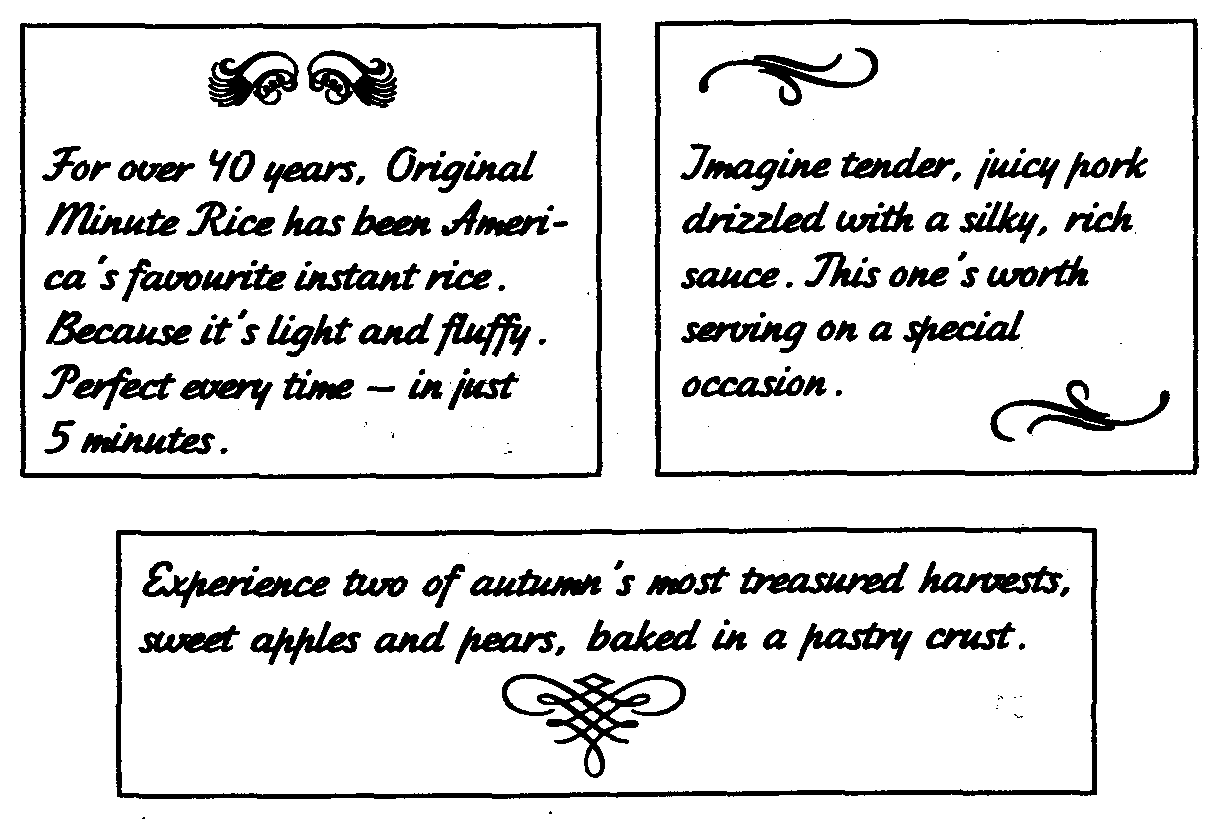 II. Read your adverts in turn. Each student should find fault with the food advertised before when his or her turn comes. ► Pattern: a) The ice-cream you advertise may be tasty, but I'm sure it's too cold for me. I hate having a sore throat. b) Peanut butter is certainly very nourishing, but I don't like the way it smells. c) It sounds like a great thing to eat, but I'm afraid it will stick to my teeth. Besides, it's too fattening. Exercise 29 Work in pairs. Imagine that you are going on a picnic. Make up dialogues discussing the food and utensils that you are going to take. You can use the following expressions: Why don't we take ... We can't do without ... ... is a must. We'll certainly need ... We are sure to need ... ... will be of use, no doubt. It could be a good idea to take ... 0 Explain the meaning of the following proverbs. 1. The glutton digs his grave with his teeth. 2. The proof of the pudding is in the eating. 3. You can't eat a cake and have it. 4. The appetite comes with eating. 5. Man does not live by bread alone. 6. Too many cooks spoil the broth. 7. First catch your hare then cook him. 8. You cannot make an omelette without breaking eggs. 9. Enough is as good as a feast. 10. Hunger is the best sauce. 11. Dog does not eat dog. Exercise 31 Comment on the quotations: 'Tell me what you eat and I will tell you who you are.' Anthelme Brillat-Savarin 'Man is the only animal that can remain on friendly terms with the victims he intends to eat until he eats them.' Samuel Butler 'A gourmet is just a glutton with brains.' Philip W. Haberman Jr. 'Where the guests at a gathering are well-acquainted, they eat 20 percent more than they otherwise would.' Edgar Watson Hawe 'The whole of nature, as has been said, is a conjugation of the verb to eat in the active and passive.' William Ralph Inge Exercise 32 Find out what the following English idioms 1. to bite off more than one can chew A. to have a lot of tasks 2. to take something with a pinch of salt B. extremely rich in producing food 3. to have a lot on one's plate C. to be sold out very quickly 4. to know which side one's bread is buttered on D. to make an unpleasant thing seem less so 5. flowing with milk and honey E. not to believe entirely 6. to sell like hot cakes F. to be an unwanted member of a trio 7. a storm in a tea-cup G. where one is in a position of advantage 8. to sugar the pill H. for certain 9. to play gooseberry I. to attempt to do more than one can 10. as sure as eggs is eggs J. disturbance over a trifling matter mean matching the two parts. Exercise 33 Role play "A Students' Party" Setting: At a university hostel. Situation: Two groups of Russian and British students decide to celebrate some holiday (Christmas, New Year, Easter, etc.) together and cook national dishes to treat each other. They cook, discuss the recipes, make others guess, what they have put into the dishes, and choose the best cooks. Cards I—VII — Russian students. They cook ravioli, borsch, Russian salad. Cards VIII—XIV — English students. They cook a pudding, turkey, vegetables. WRITING Exercise 1 Prepare to write a dictation. Learn the spelling of the words in bold type from Introductory Reading and the words from exercise 1 on page 176. Exercise 2 Translate the text in writing. В этом году всё сложилось удачно. Праздник 8 марта совпал с масленицей, вместе с ней и закончился. Нам, грешным, одним искушением меньше. Прямо с понедельника начался Великий пост. Во время первой русской революции и последнего царя пищей называлось «всякое вещество ... годное для поддержания, обновления и увеличения тела». И увеличение никого не смущало. В то время в салат «Оливье» вместо картошки полагалось класть черную икру. Так, по крайней мере, советовали в тогдашней поваренной книге. Оглянуться не успели, еда из удовольствия превратилась в проблему. Каких-нибудь полвека спустя знаменитая сталинская «Книга о вкусной и здоровой пище» открылась словами: «Проблема питания — одна из основных проблем». Дальше — больше. Выяснилось, что от еды жди беды. Сахар — это белая смерть, кофе — черная, масло — желтая ... Откусывая очередной кусок, надо помнить: жирное вредно для сердца, нежирное — для желудка. Отсутствие мяса замедляет процесс старения и делает организм более выносливым. Каждое движение челюстей — это выбор между бодрой старостью и затянувшейся, безрадостной молодостью. Здоровый образ жизни — тот самый, где образ есть, а жизни нет. В общем, как говаривал великий шотландец Роберт Бёрнс, благодарите Бога, если ваши желания совпадают с вашими возможностями: «У которых есть, что есть, те подчас не могут есть. А другие могут есть, да сидят без хлеба.» Социологические обследования показывают: стоит нашим гражданам разбогатеть, они сразу накидываются на постненькое. «Новые русские» едят почти в три раза больше фруктов и рыбы, чем «старые». По данным Всероссийского центра уровня жизни, мяса и масла на российских столах вполовину меньше, чем на американских. Зато молока, сыра и яиц — легко усвояемых белков - на 20% больше. Мы на верном пути — к здоровому образу жизни. Жаль только, что со здоровьем по-прежнему как-то неважно. Видно, голодание не всегда лечебное. (Из еженедельника «Аргументы и факты») Exercise 3 Write a dream menu for a day. Exercise 4 Write an essay on one of the following topics: A. 1. From All Diets I Choose ... 2. Non-Traditional Food — Pros and Cons. 3. Better Cooks — Men or Women? 4. Each Family Has its Own Style of Cooking. 5. What I Like and What I Hate to Eat. B. 1. It's No Use Crying Over Spilt Milk. 2. There is Many a Slip Between a Cup and a Lip. 3. Half a Loaf is Better than No Bread. Note: Punctuation (continued from page 167.) Punctuation marks with direct speech are used differently in British English. There are two approaches. The prevailing one is to use double quotation marks for most purposes, and single ones for quotations within quotations (e.g. "Well, so he said to me 'What do you mean by it?' and I said 'I didn't mean anything' ". Single quotation marks are also used for isolated words, short phrases, and anything that can hardly be called a formal quotation. The other method is that adopted by the Oxford University Press, of reserving the double marks exclusively for quotations within quotations. But for this difference the use of other punctuation marks in both approaches is similar: 1) quotation marks are placed at the top of the line; 2) the words introducing direct speech are followed by a comma (or occasionally by a colon, particularly when the direct speech starts a new paragraph); 3) when the words of the author interrupt direct speech in the middle of a clause they are set off by commas and the first word of the second half of the clause is spelt with a small letter (e.g. 'Oh,' he said, 'so that is the long and the short of it?'); 4) when the words of the author are inserted between two independent clauses these words are preceded by a comma or the punctuation mark required after the first clause. The words of the author are followed by a roll stop (e.g. 'Quite correct, said the host. 'Quite correct.' / 'What is this? ' he asked. 'I do not understand.'). |
